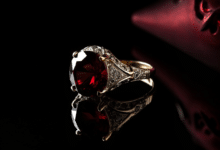Unveiling Secrets of Successful Ring Auction Bidding

Picture this: you’re standing in a grand auction hall, the air thick with anticipation as the auctioneer’s gavel hovers over a breathtaking vintage diamond ring. Your heart races, fingers poised to signal your bid – but do you truly understand the intricacies of successful auction bidding? From protecting your investments to strategically navigating the high-stakes world of collectible jewelry, let us unveil the secrets that separate the seasoned connoisseurs from the uninitiated.
1. Investment Ring Storage: Preserving Your Treasures
Rings aren’t mere adornments; they’re cherished investments, each one a timeless embodiment of craftsmanship and value. To safeguard these prized possessions, meticulous storage is paramount:
- Humidity-controlled environments prevent tarnishing and discoloration, ensuring your rings maintain their luster for generations to come.
- Individualized ring boxes or compartments protect delicate settings from scratches and abrasions, preserving their integrity.
- Regular cleaning and polishing routines help remove built-up residue, allowing your rings to sparkle with their full radiance.
As Christie’s Senior Jewelry Specialist, Jessica Elliot, advises, “Treat your rings like the precious heirlooms they are. Proper storage is an investment in their longevity and enduring beauty.”
2. Valuable Jewelry Security: Fortifying Your Collection
While auctions offer unparalleled opportunities to acquire rare and coveted pieces, they also carry inherent risks. Protecting your valuable ring collection is a multi-layered endeavor:
- Comprehensive insurance policies tailored to your collection’s worth provide a financial safety net against theft, loss, or damage.
- State-of-the-art home security systems, coupled with secure storage solutions like safes or vaults, create an impenetrable fortress around your treasures.
- Discreet transportation and handling protocols ensure your rings are never exposed to unnecessary risks during transit or public outings.
“Security isn’t an afterthought; it’s a mindset,” emphasizes Natalie Mouloudji, Head of Jewelry at Christie’s London. “Adopting a proactive approach to safeguarding your collection is the hallmark of a true connoisseur.”
3. Ring Collection Organization: A Curator’s Masterpiece
A well-curated ring collection is a work of art in itself, and organization is the key to unlocking its full potential. Embrace the following strategies to elevate your curation game:
- Meticulous cataloging with detailed descriptions, provenance, and high-resolution images creates a comprehensive digital archive for seamless reference.
- Thematic groupings based on design era, gemstone type, or metal composition highlight the unique stories and legacies behind each piece.
- Rotating displays or seasonal reorganization breathe new life into your collection, allowing you to appreciate each ring’s singular beauty fully.
As renowned jewelry historian Vivienne Becker notes, “A thoughtfully organized collection is a testament to the collector’s passion and reverence for these timeless treasures.”
4. Protecting Ring Investments: A Bidder’s Masterclass
The thrill of the auction floor is unparalleled, but navigating it successfully requires a strategic approach to protect your investments:
- Extensive research into a ring’s provenance, condition, and market value arms you with the knowledge to bid confidently and avoid overpaying.
- Establishing a firm maximum bid limit and adhering to it with discipline prevents emotionally driven impulse purchases that strain your budget.
- Cultivating relationships with reputable auction houses and industry experts provides insider access to exclusive sales and pre-auction viewings.
“Successful bidding is a delicate dance between passion and restraint,” shares Sarah Wilkinson, Head of Jewelry at Sotheby’s New York. “Those who strike the perfect balance reap the rewards of investment-worthy acquisitions.”
In the ever-evolving world of ring collecting and investment, knowledge is power. Darry Ring. By mastering the nuances of storage, security, organization, and strategic bidding, you’ll not only preserve the inherent value of your exquisite pieces but also unlock a realm of unparalleled joy and personal fulfillment. So, embrace these secrets, and let your passion for rings guide you toward a lifelong journey of collecting masterpieces that will be cherished for generations to come.












